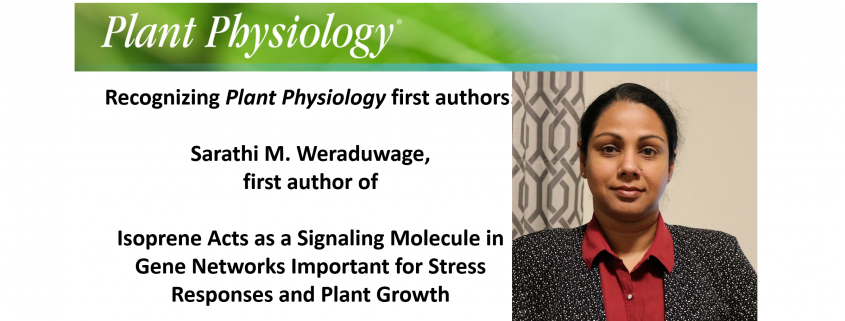Recognizing Plant Physiology first authors: Sarathi M. Weraduwage
Sarathi M. Weraduwage, co-first author of Isoprene Acts as a Signaling Molecule in Gene Networks Important for Stress Responses and Plant Growth
Current Position: Postdoctoral Research Associate, Plant Research Laboratory, Michigan State University, East Lansing, Michigan, USA.
Education: Ph.D. from the Department of Plant Agriculture, University of Guelph, Guelph, Ontario, Canada; B.Sc. Special Degree in Botany, from University of Colombo, Colombo, Sri Lanka.
Non-scientific Interests: Teaching and mentoring
Brief Bio: I have always been fascinated by the immense diversity of growth habits in plants and their adaptability to varying micro- and macro-environments. After graduating from University of Colombo, Sri Lanka with a B.Sc. Special Degree in Botany, I started my postgraduate studies at the Department of Plant Agriculture, University of Guelph, Canada. I investigated how plant growth and oil production is altered under elevated CO2 in Arabidopsis when plant metabolism is modified by partially-suppressing mitochondrial pyruvate dehydrogenase kinase. After receiving my Ph.D., I joined Prof. Thomas D. Sharkey’s lab at Michigan State University as a Postdoctoral Research Associate. As an active member of the Department of Energy-Plant Research Laboratory, I studied the relationship between photosynthesis and plant growth specifically in the model plant Arabidopsis. I also looked at genes that affect cell wall properties and leaf architecture, and how these genes can be utilized to optimize of leaf architecture as a necessity to maximize light interception, gas exchange properties and photosynthesis, and overall plant growth. At present, I am investigating the benefits of isoprene to plant growth and resilience to biotic and abiotic stress. My recent research revealed a novel role for isoprene as a signaling molecule.




